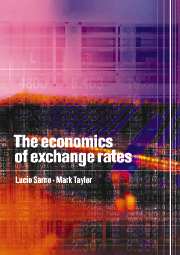Book contents
- Frontmatter
- Contents
- Foreword by Jeffrey A. Frankel
- Preface
- 1 Introduction
- 2 Foreign exchange market efficiency
- 3 Purchasing power parity and the real exchange rate
- 4 Exchange rate determination: theories and evidence
- 5 New open-economy macroeconomics
- 6 Currency unions, pegged exchange rates and target zone models
- 7 Official intervention in the foreign exchange market
- 8 Models of currency crisis and speculative attack
- 9 Foreign exchange market microstructure
- Author index
- Subject index
Foreword by Jeffrey A. Frankel
Published online by Cambridge University Press: 05 September 2012
- Frontmatter
- Contents
- Foreword by Jeffrey A. Frankel
- Preface
- 1 Introduction
- 2 Foreign exchange market efficiency
- 3 Purchasing power parity and the real exchange rate
- 4 Exchange rate determination: theories and evidence
- 5 New open-economy macroeconomics
- 6 Currency unions, pegged exchange rates and target zone models
- 7 Official intervention in the foreign exchange market
- 8 Models of currency crisis and speculative attack
- 9 Foreign exchange market microstructure
- Author index
- Subject index
Summary
Research is supposed to proceed according to what is called the scientific method. Hypotheses are proposed, tested, and enthroned if consistent with the evidence. The accretion of knowledge is supposed to be cumulative over time, discarding what is at odds with evidence and retaining what works. The ability to answer questions about the real world is supposed to be the ultimate motivation.
Unfortunately, economics does not always work that way. Intellectual fads and the effort to demonstrate mathematical prowess sometimes dominate the research agenda. Everyone becomes more specialised, and few seek to synthesise. Some even forget that the ultimate goal is to design models consistent with the real world and that, for example, the derivation of behaviour from principles of optimisation should be considered only a tool to that end.
After the rational expectations revolution of the 1970s, the study of exchange rates turned nihilistic in the 1980s. It was discovered that a decade or two of experience with floating currencies had not provided enough data to verify some of the systematic patterns of movement in real or nominal exchange rates that the theories of the time had predicted. Statistical tests failed to reject the hypothesis that the nominal exchange rate followed a random walk, or that the real exchange rate followed a random walk. This meant, embarrassingly, we had nothing to say that would help predict changes in such variables.
- Type
- Chapter
- Information
- The Economics of Exchange Rates , pp. ix - xPublisher: Cambridge University PressPrint publication year: 2003
- 3
- Cited by



